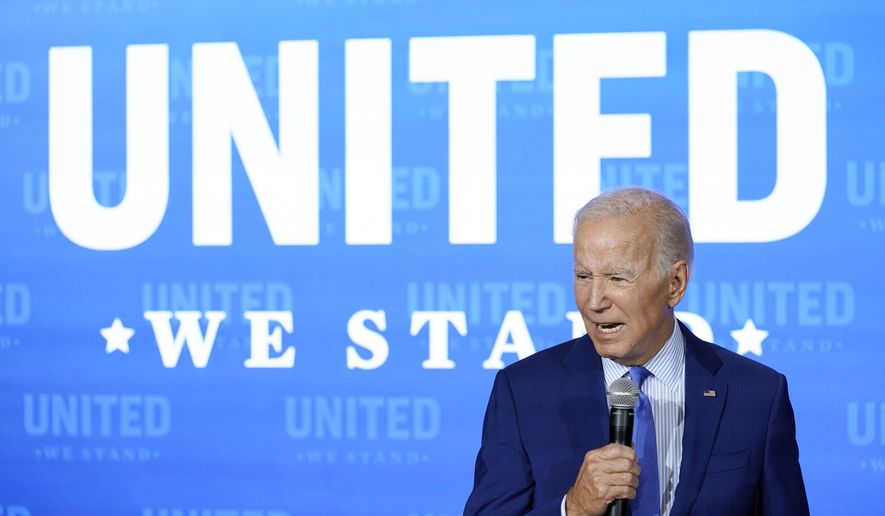OPINION:
Lost in the penumbra of the idiocy of Team Biden’s celebration of yet another terrible number on inflation was President Biden’s “United We Stand” Summit, which was designed to alert people that Mr. Biden opposes White supremacists. Fair enough.
It might have been good had Mr. Biden spent a moment or two during his remarks noting a few obvious elements of the violence, political or otherwise, that plagues our nation.
Instead, Mr. Biden’s remarks were unfortunately on brand. He inserted one outright fabrication – that he was teaching at the time he decided to run for president in the wake of Charlottesville. He was, in fact, simply picking up a check ($900,000 for two years) from the University of Pennsylvania. He taught no classes or seminars or anything. He did, however, later manage to reward the president of Penn by appointing her ambassador to Germany, even though she had no foreign policy experience at all.
He also retreaded his own biography on civil rights, this time noting that he “got involved in politics because of civil rights as a kid.” That is at least the third variation of the story of his connection with the civil rights movement, not counting episodes of him hanging around with his segregationist friends in the Senate.
The president served up the usual nonsense about domestic terrorism “is the greatest terrorist threat to our homeland today.” If we really believed that, our budgets would surely, eventually, reflect our perception of that risk. They don’t. The Department of Defense’s budget is about 10 times the budget for the Department of Homeland Security. If domestic terrorists were really that big a problem, that ratio would be much smaller.
Do you know what Mr. Biden didn’t talk about at all? He didn’t talk about the 60 or so fire-bombings and other destruction directed at pregnancy centers in the last three months. Nor did the most Catholic president ever mention the more than 200 attacks on Catholic churches over the last two years. Keep working on those rosary beads, Mr. President.
He also did not talk about the riots of 2020. Those riots, at least some of which were racially motivated, resulted in at least 30 deaths and about $2 billion in damages. While the justice system may not have completely ignored the rioters, it is safe to say that the full weight of the law was not visited on them, either.
Mr. Biden also managed to avoid talking about instances like the murders in Waukesha, Wisconsin, which were obviously racially motivated.
Finally, the president eluded discussion of the real violence under which our nation suffers. The simple fact, available to all who choose to see, is that a disproportionate percentage of the victims of violent crime are Black people, usually themselves trapped in a cycle of despair that is promoted, if not created, by the policies of the Democratic Party.
According to Mark Perry at the American Enterprise Institute (using data from the Centers for Disease Control and Prevention), in 2020, about 12,000 Black people were shot and killed, mostly by other Black people and almost none of them by White supremacists. There were 26.6 homicides per 100,000 Black persons; about 12 times greater than the rate for White people (2.2) and six times greater than the rate for Hispanics (4.5). For comparative purposes, 12 unarmed Black people have been shot and killed by police in the last two years.
The president did not talk about these numbers. Nor did he mention the role played by local prosecutors who have no interest in enforcing the law. Nor did he mention the role played by elected officials – almost all Democratic – whose policies perpetuate cycles of dependency, hopelessness and the consequent violence.
So, forget the propaganda about White supremacists and unity summits and all of that. If you really want to start to address violence – political or otherwise — in this nation, we need to get serious about law enforcement. We need to think more carefully about the second-order consequences of government policies that create and embed multi-generational dependency in communities. Finally, before we can have any hope of fixing our problems, we need to be honest with each other about what the real problems are.
Michael McKenna, a columnist for The Washington Times, co-hosts “The Unregulated” podcast. He was most recently a deputy assistant to the president and deputy director of the Office of Legislative Affairs at the White House.




Please read our comment policy before commenting.